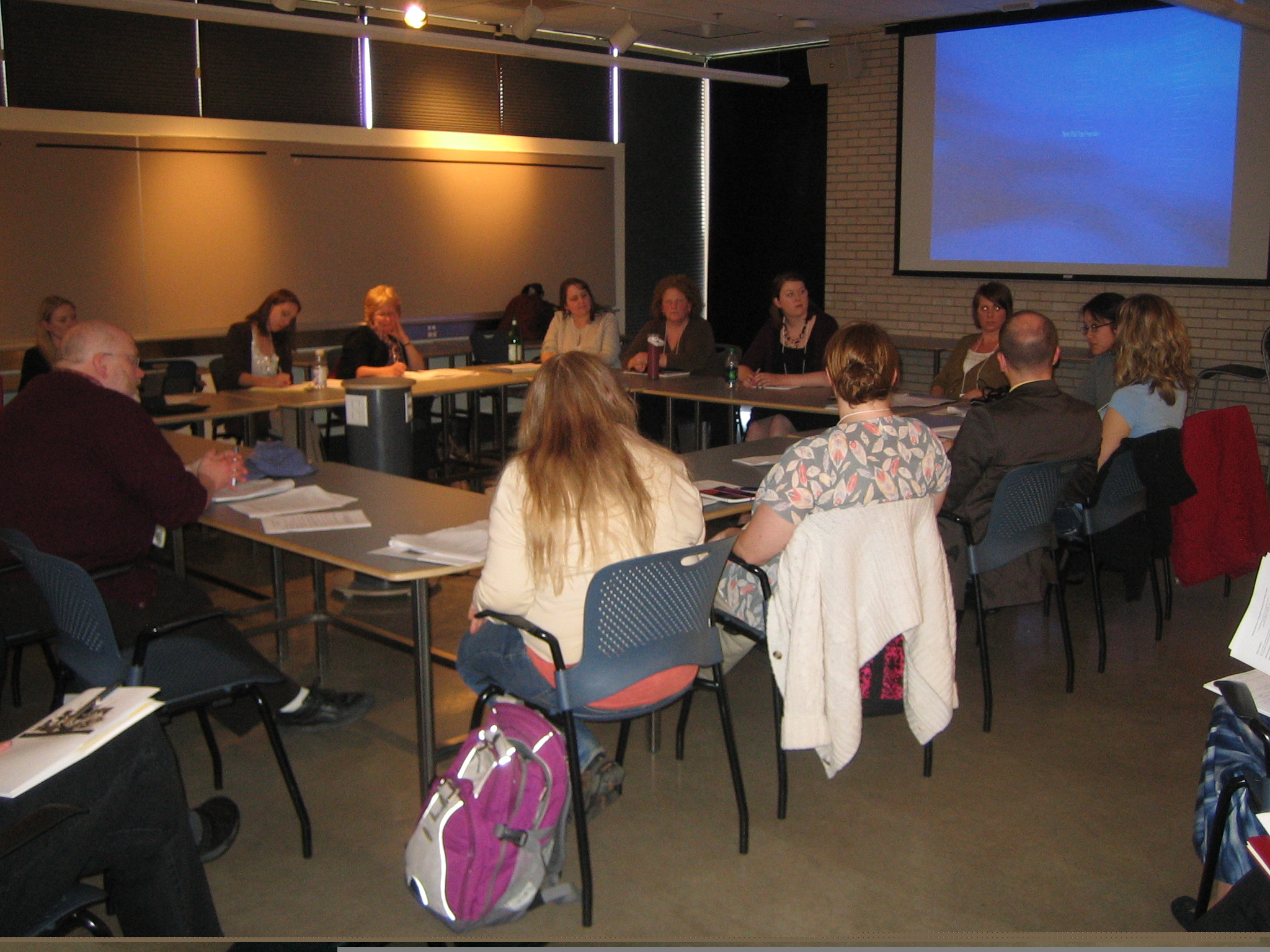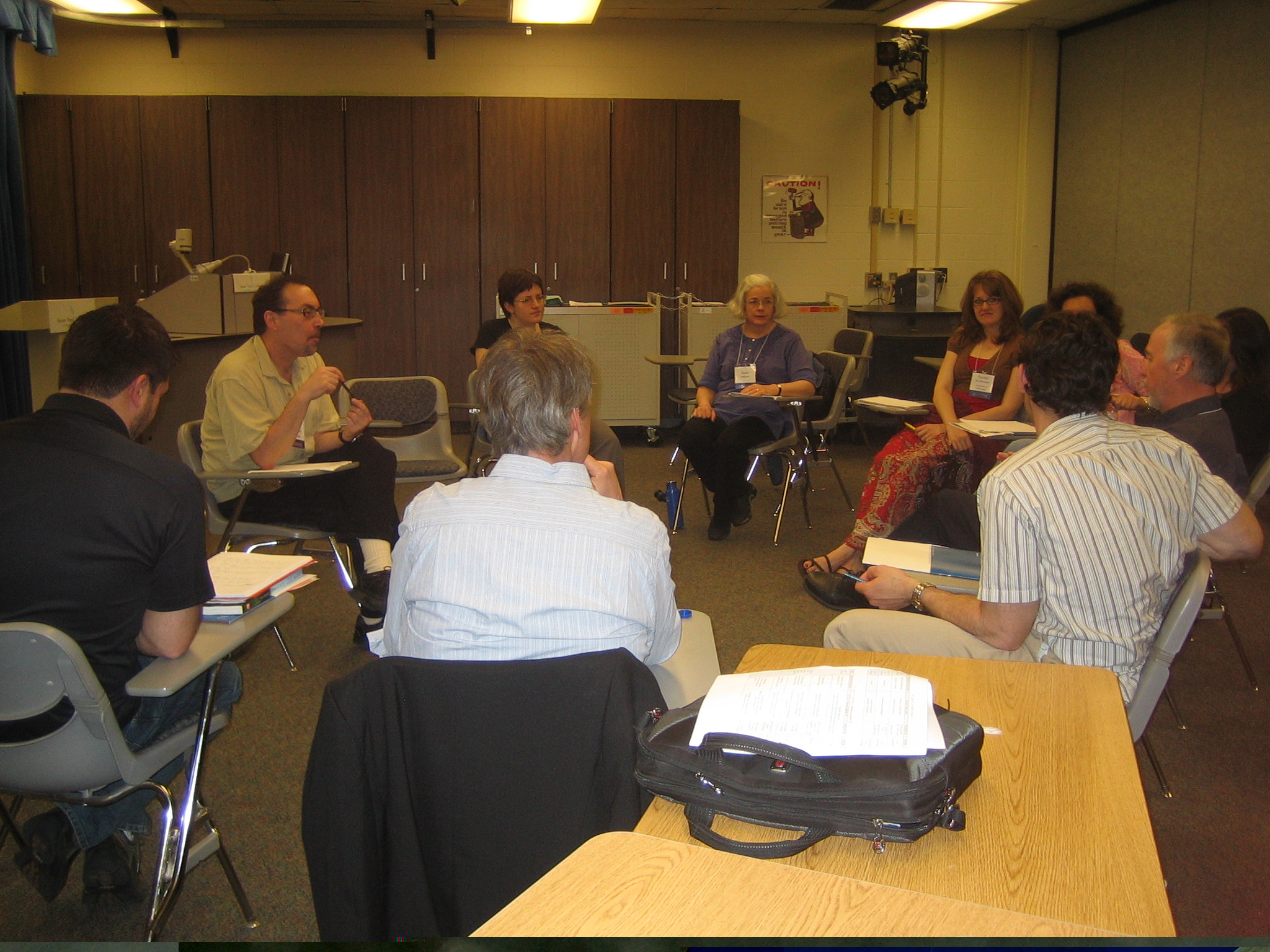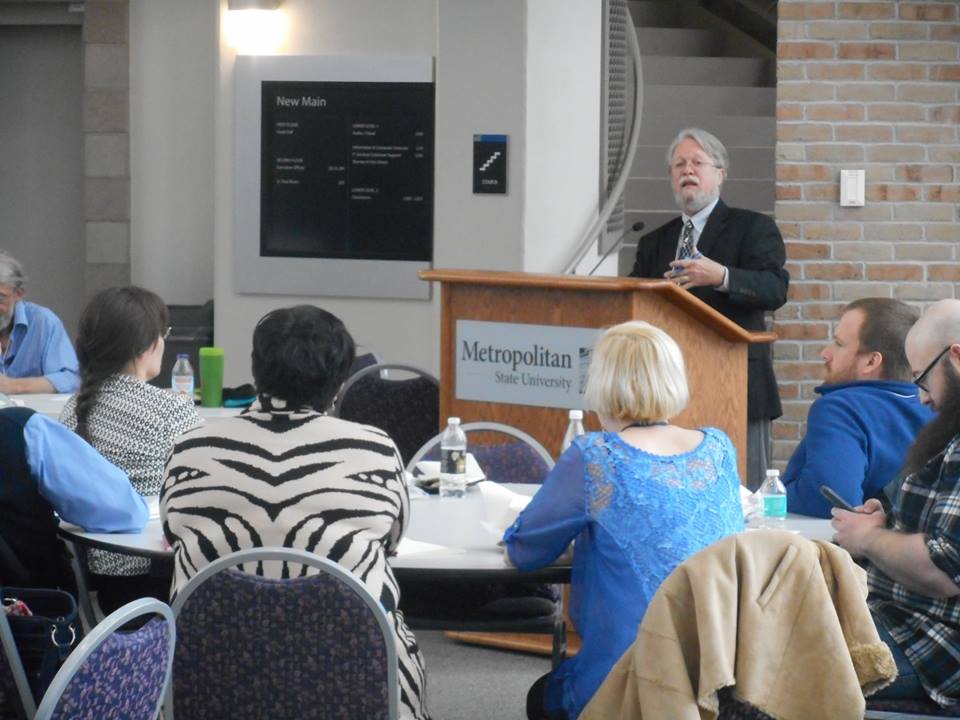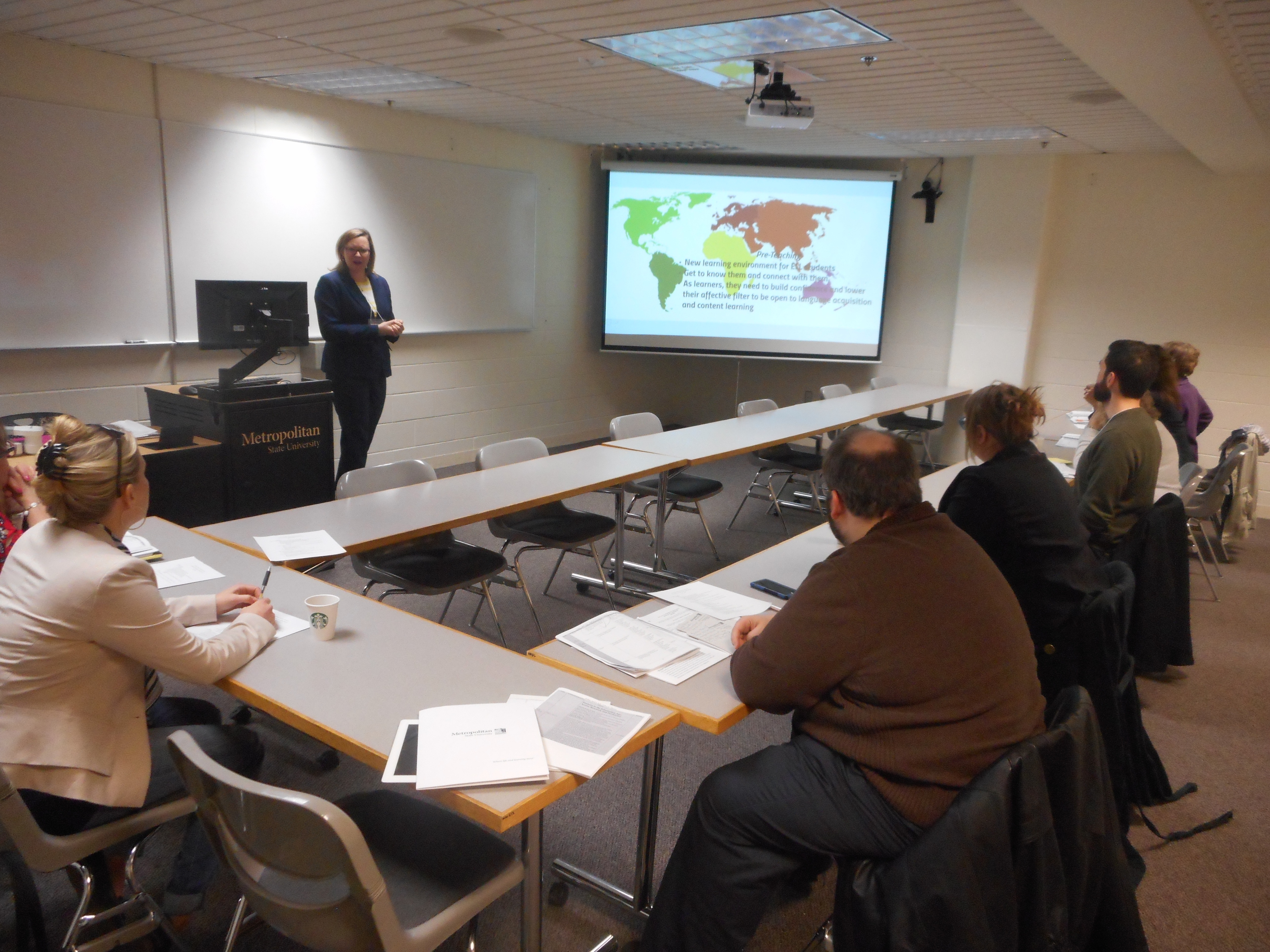|
“MnWE News” Late
Fall Issue,
November-December
2018
If you have
trouble reading
this
email or want
back issues, go
to
www.richard.jewell.net/MnWE/Newsletters/MnWENews.htm
In this issue:
1.
PROPOSAL FOR
MnWE CONFERENCE
APRIL 5-6?
2. “A SELF-CARE
STRATEGY FOR
BELEAGURED
ACADEMICS”
3.
METHODS: WEEKLY
CORRESPONDING
WITH STUDENTS?
4.
CAN DEPARTMENTS
AND COMMITTEES
BE GOOD TEAMS?
5. About
MnWE:
Forwarding the
News,
Joining/Leaving,
Grad Credit,
Representatives
If you are a
MnWE
representative,
please forward
this email to
colleagues in
English,
Writing and
related fields.
Many new faculty
and writing
tutors may not
be on the email
list.
If you are a
long-term member
of this
listserv, thank
you
for your
continued
participation.
If you are new,
welcome! Our
listserv emails
go to over 2000
English,
Writing, and
related Upper
Midwest faculty.
To join, send a
request to the
editor at
richard at
jewell dot net.
Our website is
www.MnWE.org.
Our next
conference is on
“Connecting
Reading and
Writing” at
North Hennepin
Community
College
Fri.-Sat., April
5-6, 2018. You
are welcome to
attend our next
Committee
meeting at UM-TC
in Nicholson 235
on Fri., Nov. 9,
or email Richard
to ask how to
Skype into the
meeting..
–
Richard Jewell,
Editor
1. YOUR
PROPOSAL FOR
MnWE CONFERENCE
APRIL 5-6?
Due:
January 30, 2019
Would
you like to
propose an idea
for the MnWE
Conference
Fri.-Sat., April
5-6? You may
present on
anything you’d
like using just
notes, a paper,
or even a poster
for everyone to
see. Let us know
what’s new;
what’s old that
you’ve polished,
rethreaded, or
retreaded; or
something you
have already
presented–or
would like to
practice–for
another
conference.
Proposals need
only 50-100 w.
or fewer, and
you may present
at the
conference using
your choice of
your own brief
notes, a rough
draft, a
finished paper,
or a poster
(displayed in
the general
registration/coffee
area). You also
are welcome to
present alone or
with one to
three other
colleagues.
Your
proposal need
not be about our
theme. Anything
to do with
writing,
English, and
related subjects
is acceptable.
However, if you
would like to
work with this
year’s theme, it
is “Connecting
Reading and
Writing.”
Our
keynoters will
speak to this
theme. Friday’s
lunchtime
keynoters are
Teaching
Professor and
fiction author
Shannon Gibney
of Minneapolis
Community and
Technical
College, and
Associate
Professor of
Library and
Information
Science Sarah
Park Dahlen of
St. Catherine
University. They
will talk about
the
intersections of
writing and
reading in
college courses.
Saturday’s
lunchtime
keynoters are
two of
Minnesota’s top
college reading
faculty, Shirley
Johnson and
Linda Russell,
who will talk
about
understanding
students’
reading
abilities, and
how we can teach
students to read
research and
other sources
better.
We
encourage you to
send a proposal!
The holiday
break is a great
time to develop
your ideas as
you sip eggnog
(or something
stronger) and
eat cookies
(left for
Santa). Think a
few minutes
about MnWE and
what you could
present. Then
send us your
proposal!
---
The Call for
Proposals,
Proposal Form,
and
Registration:
www.MnWE.org
---
2. “A
SELF-CARE
STRATEGY FOR
BELEAGURED
ACADEMICS”
This
is the title of
Pam Whitfield’s
recent
Chronicle of
Higher Education
article. Pam, a
Teaching
Professor in
Rochester
Community
College’s
English and
Equine Science
Departments,
describes how
every “teacher
needs a magic
briefcase full
of heartwarming
student
letters.” She
begins by
describing a
disheartening
performance
review with a
supervisor more
interested in
perfect
paperwork and
better rubrics
for tracking
self-performance
than in student
evaluations and
letters.
Pam says
she made two
decisions from
that experience.
First, she would
be more careful
to use whatever
evaluative
methods her
supervisor of
the moment
wanted. Second,
she decided to
collect all of
the positive
letters and
notes from her
teaching years
in her own “Be
Kind Portfolio.”
Among them was a
group from her
past college
president, who
had let her
know, during his
tenure, whenever
he heard a
student speak
positively about
her. She also
had many thank
you notes and
letters from
students for
whom she had
become a special
teacher.
Whenever
she is feeling
low about
teaching, she
says, she opens
her Be Kind
Portfolio, her
“magic bag to
dip into.” It
reminds her of
her positive
accomplishments
with students.
Pam
suggests you
develop your own
Be Kind display.
It could be a
portfolio, a
display of thank
you notes
propped on a
nearby
bookshelf,
certificates
you’ve received
that you display
in your office
or elsewhere, or
some of the
best-ever
evaluation notes
and thank yous
that students
have given you.
And, she notes,
what you collect
can also be used
to “update your
CV every few
years.”
---
Chronicle
article:
www.chronicle.com/article/A-Self-Care-Strategy-for/243521
---
3. METHODS:
CORRESPONDING
WITH STUDENTS?
The art
of the letter is
not dead. In
fact,
increasingly, it
is being revived
for the college
classroom. Some
faculty use
memoir and
journal writing
for
students, but
have you tried
corresponding
with each
student about
your course?
Some teachers do
this weekly,
some at the
beginning,
middle, and end
of the term. You
simply ask
students to
write about
their thoughts
or questions
about your
course, either
in a paragraph
or list. Two
ways to do this
are:
(1)
Simply ask your
students to
write, at home,
what questions
they have, how
the course is
working for
them, etc. Ask
them to turn in
their letters
(or emails) to
you. Some
faculty set a
minimum length
and offer credit
to encourage
more questions.
You can simply
collect and read
them, reply to
some of them in
class (with no
names and with a
prior warning
that you may
read some of the
questions
aloud), or
answer each
student
individually in
writing, even if
you say nothing
more than
“thanks!”
(2) Or
instead, in
class, ask
students to
write a quick
question about
the course, its
papers, or other
concerns. Then
you can answer
in class, as
above, respond
to each briefly
in writing, or
use both types
of responses,
depending on the
questions.
Some
kind of response
from you, at
some time, is
helpful, say
those who use
these methods.
However, they
say, even if you
don’t respond
every time, or
just to them as
a class and not
always
individually,
students begin
to feel you are
in a
conversation
with them. As a
result, they are
more likely to
listen to you.
In addition,
their expression
of their
concerns helps
them to focus
better on what
they need to do
for course
success. They
also are more
likely to work
harder for you.
Some
teachers even
ask each student
to use the same
sheet of paper
each time: the
student’s
questions and
your responses
then form a
continuing chain
to which both of
you can refer as
the conversation
proceeds, and
this sheet also
can be turned in
at the end of
the course for
credit. The more
individualized a
student feels
about an
academic
relationship
with you, say
those who
recommend these
methods, the
more likely the
student
understands what
you expect and
works to achieve
it.
All of
these methods
can be used in
print or online
in the
classroom, at
home, and
online. Some
faculty ask
students to
discuss their
answers with
each other in
small groups or
in discussion
boards.
---
Journaling:
www.wlu.edu/Documents/institutional-effectiveness/spring-term/journal-as-teaching-tool.pdf
Anonymous
questions:
www.facultyfocus.com/articles/effective-teaching-strategies/a-simple-trick-for-getting-students-to-ask-questions-in-class/
Dialogue
journals:
www.cultofpedagogy.com/dialogue-journals/
---
4. CAN
DEPARTMENTS AND
COMMITTEES BE
GOOD TEAMS?
In
education, we
often don’t pay
attention to
what for-profit
businesses say
about working
with people,
especially as
such advice is
from
hierarchical
authority
structures.
However, when it
comes to working
together well in
small groups, an
article from
Google may be
helpful: “Google
Spent Years
Studying Great
Teams. These 5
Qualities
Contributed Most
to Its Success.”
Google
named its
research
“Project
Aristotle.”
Researchers
examined 180
teams, both high
and low
performing. The
five qualities
that Google
found important
are:
1.
Psychological
Safety: “[T]eammates
feel safe to
take risks….”
2.
Dependability: “[M]embers
reliably
complete quality
work on time….”
3.
Structure and
Clarity: “Goals…must
be specific…and
attainable.”
4.
Meaning: “Finding
a sense of
purpose…is
important for
effectiveness….”
5.
Impact:
“[O]ne's work…is
making a
difference….”
Are you looking
for advice on
how to better
facilitate your
own work groups?
Some of the
suggestions may
even be useful
when you are
using in-class
student teams or
groups.
---
Article:
https://www.inc.com/justin-bariso/google-spent-years-studying-great-teams-these-5-qualities-contributed-most-to-their-success.html?cid=hmsub1
---
5. About
MnWE (repeated in
each newsletter):
FORWARDING/JOINING:
Please forward
this email to
others,
especially if
you are a MnWE
representative
listed below.
Your newer
full-time and
adjunct faculty
members,
graduate
students, and
writing center
tutors may not
receive it.
If you
are not on the
listserv and
would like to
join it, simply
send your
request and
email address to
richard at
jewell dot net.
WHO WE ARE:
“MnWE” is
“Minnesota
Writing and
English,” an
organization
with a
coordinating
committee, a
listserv, and an
annual spring
conference by
and for college,
university, and
college-in-the-high-schools
English and
writing faculty,
graduate and
undergraduate
students, and
related academic
and literary
scholars,
writers, tutors,
and others in
the Upper
Midwest. Our
purpose is to
bring together
these
communities in
Minnesota,
western
Wisconsin, north
and central
Iowa, and the
eastern
Dakotas.
Our
website is
MnWE.org;
our geographical
center is
Minneapolis-St.
Paul. Over 2500
faculty, tutors,
and graduate
students are on
our listserv.
Our listserv
members come
from public and
private two-year
colleges, state
universities,
private
four-year and
graduate-degree
colleges, high
schools, and the
Universities of
Minnesota,
Wisconsin, and
North Dakota.
Our activities
are led by a
large, active
committee of
representative
volunteers.
GRADUATE
CREDIT:
Anyone may earn
one graduate
credit from
Southwest
Minnesota State
University for
attending one
MnWE Conference
day and writing
a related
research paper
(up to three
times). For
questions about
this course—“Eng
656: MnWE
Practicum”—please
contact lisa
dot lucas at
smsu dot edu
or see
www.smsu.edu/academics/programs/english/?id=11637
.
HOW TO REMOVE
YOURSELF FROM
THE LIST:
If you want to
be removed from
this listserv,
please do so
yourself,
following
directions at
the very bottom
of this email.
If you try
without success,
then send an
email to
richard at
jewell dot net
indicating (1)
this problem,
(2) your
specific email
address copied
from the
directions at
the bottom of a
MnWE mailing,
and (3) your
request for
removal.
FORMATTING,
INVITATION, &
CREDITS:
These listserv
emails usually
are formatted in
a simple way
using html. If
you cannot read
them, please go
to the link at
the top right to
see them on the
Web.
If you
have any
questions, we
invite you to
email any of us
on the
committee. You
also are always
invited to
attend any of
our five MnWE
Committee
meetings per
year. You also
are invited to
offer
suggestions—or
volunteer your
leadership—for a
special or
double section
at the annual
conference.
This
newsletter is
written
primarily by
Richard Jewell
without
copyright so
that anyone may
quote,
paraphrase, or
forward any or
all of it
freely. We ask
only that you
give credit to
the “MnWE
Newsletter”
and/or “www.MnWE.org“;
and when you use
material that
has been quoted
or paraphrased
in this
newsletter from
other sources,
please be sure
to give proper
credit to the
original
source.
---
---
Richard Jewell,
General
Coordinator
Larry Sklaney,
Conference
Coordinator
Danielle
Hinrichs,
Program
Coordinator
Gordon and Beata
Pueschner,
Registration
& Floor Events
Coordinators
Alexander
Champoux, UMN,
2018 Site
Coordinator
Vanessa Ramos,
NHCC, 2019 Site
Coordinator
richard at
jewell dot net
- (612) 870-7024
larry dot
sklaney at
century dot edu
- (651) 747-4006
danielle dot
hinrichs at
metrostate dot
edu - (651)
999-5960
gordon dot
pueschner at
century dot edu
- (651) 686-4468
beata dot
pueschner at
anokaramsey dot
edu - (651)
686-4468
champ147 at
umn dot edu
vramos at nhcc
dot edu
MnWE.org
Minnesota Writing & English
A Consortium of
Colleges &
Universities
|

Mission:
Transforming
writing and
English
into teaching
and learning
experiences
using
methodologies
that serve
students best.
Vision:
Bringing
scholarly ideas
and practical
pedagogy
together
to
create our
futures.
.JPG)
Donald Ross of
the University
of
Minnesota and
Taiyon Coleman
of St. Catherine
University run a
breakout session
about
literature.

Geoffrey Sirc of
the University
of Minnesota
runs a small
breakout after
his keynote
presentation.

MnWE started in
2007.
The cofounders
were Richard
Jewell, here
giving a welcome
after lunch, and Donald
Ross, first
picture above.

During a 2016
breakout,
Beata Puschner
presentson improving
classroom
inclusion of ELL
students.
|